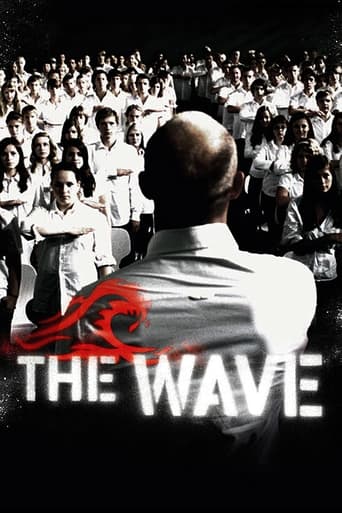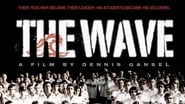rahumate
Die Welle (English: The Wave) is a 2008 German sociopolitical thriller directed by Dennis Gansel. It is starring Jürgen Vogel, Frederick Lau, Jennifer Ulrich and Max Riemelt in the leads. Die Welle is based on Ron Jones' social experiment The Third Wave. The film was produced by Christian Becker for Rat Pack Filmproduktion, It one of the hot favorite German cinema among critics.The Wave is one of the movies to convert a social experiment into a fictionalized plot. As the Stanford prison experiment of 1971 was adopted 2001 production Das Experiment by Oliver Hirschbiegel, and the 2015 production directed by Kyle Patrick Alvarez.Die Welle Gansel's Wave is based on teacher Ron Jones's "Third Wave" experiment, which took place at a Californian school in 1967. He explains the concept of National Socialism through live experiment of totalitarian, strictly-organized "movement" and harsh punishments led by him autocratically. The warm sense of community trigger wave of enthusiasm from students and they form a league. Jones admitted to having enjoyed the project but he aborts the project on the fifth day. He confess students how he implemented the parallels towards the Nazi youth movements.In 1981Morton Rhue published his book "The Wave", which was published in Germany in 1984 and has since enjoyed great success as a school literature text. It has sold a total of over 2.5 million copies.The screenplay is based on an article written by Ron Jones in which he talks about the experiment and how he remembers it. The major difference we find is physical violence and the bloody end part of the movie. "Gansel claimed in an interview that it was extremely important to him to ensure that his movie would not differ as much from the experiment as Rhue's book." The narrative style is linear and the film is narrated from the perspective of a third person. Wenger is filmed in low angle shot and sings rock music in the opening sequence; on the other hand he seems depressed in this last scene. Slow motion shots reflect tormenting self-reproaches. The subjective view of the thoughtful character relates to the dramatic composition throughout the film. Gansel justifies the radical end with the necessity of shocking the audience. We find the 'modus operandi' and nature of students who like 'real', when something is real; they get aggressive about it and accept it. Anyone if they broke the rules, they get in trouble with these secret police, who were the motivated students. This film offers real fear and intimidation. It was like a police state.Professor- broke up lines of communication between students. Some had been friends for 10 years, but he creates the atmosphere where no one could trust anybody. If you had any doubts or questions or thoughts of resistance, you couldn't tell anyone because you would get in trouble. You didn't dare ask whether it was real or not.Each day come with more surprises. And each time you thought you had understood it, there would be a new twist.Die Welle film becomes near to my research as most of the countries today are following these 'modus operandi' to rule the masses. The innocent nationals are either become zealots or get disillusioned with system.Die Welle is set in modern-day Germany. Jones says it depicts the experiment well. Denis Gansel, the director, has successfully captured the nature of kids at this time in life and history in a refreshing and accurate way - kids being techno-friendly, who resist the global economy by burning Nike.As in Economic we have macro and micro economics we have same view in politics. The regular citizens always look at micro level and never understand what is happening at macro level. This sheer negligence always takes its toll on civilization. The work of mass media is to analyze the situation and put it in front of the people. Be it a news paper we get editorial and news stories and news features. On TV we get special shows and documentaries. Internet offers many web portals with in-depth analysis. It is the technology which becomes our extension and we become lethargic to take a panoramic view.Die Welle is the unique example which demystifies the concept of 'National Socialism'. It is a World Cinema, embrace it with me.
Uncle Marvin
The Wave is a German foreign language film in the drama genre. It's Lord of the Flies meets The Stanford Prison Project. If you like foreign films for the nonformulaic content, this one is for you. The Wave is a must see for anyone interested in social studies, leadership, teaching, Nazism, or group psychology. It's a didactic cautionary tale. The plot follows Rainer Wenger, the "cool teacher" at a modern German high school. Contrary to his rock 'n' roll, anarchist beliefs, he is assigned to teach a class on autocracy. The teacher uses the project to turn the classroom into a social experiment. Along with the natural momentum of the crowd, "Herr Wenger" forms and leads a "movement," by organizing the students into a single unit with militant discipline. What follows is a transformation of the students as they galvanize around the group mentality, sense of purpose, unity, belonging, structure, and mob mentality. They radically shift their personalities and become inspired. It's a study in groupthink versus individualism. In all fairness, it's not a suspense film. The Wave features a large cast of well-developed characters. The acting was on point and you could see the fruits of the direction. Once again Europe proves that you don't need a fortune to produce quality entertainment. As an aside, Lord of the Flies was written by William Golding, a Jew, as a commentary on the potential for the average person to get swept up in Nazism. As with Jewish social scientists Maslow and Milgram, they wanted to demonstrate that the Nazi menace could happen anywhere and was not exclusive to Germany because of a cultural predisposition to authoritarianism. Golding was also British and he wanted to challenge the notion of English cultural superiority. Ironically, the Nazis at first lambasted psychology as the "Jewish medicine." Indeed, Freud and his disciples were Jewish, reflecting an historical interest in the subject dating back to Joseph, the biblical Israelite patriarch and dream interpreter. The psychoanalytic school had a token, "Aryan" Carl Gustav Jung. Jung started out as a student and close friend of Freud. They broke over philosophical and personal differences. Jung, with his theory of the "Collective Unconscious," specialized in organizational psychology. When the Nazis took over, most of the top psychologists fled Germany because they were either Jews or friends with Jews. They saw the writing on the wall and were too intelligent to go along with the program. Ever the devoted German, Jung remained, with fateful consequences.Hitler and Goebbles did an aboutface and realized the validity of psychology. Jung was recruited into the Nazi Party and became their top psychologist. He worked hand-in-hand with Propaganda Minister Goebbles in the Ministry of Information. The "Collective Unconscious" quickly became the "Racial Unconscious." Jung had a direct and responsible hand in designing Nazi rallies, for maximum impact. For example, there were torches used as decoration, the thinking being that it would inspire the rank-and-file by hearkening back to pagan roots--unconsciously. Some people believe Jung's betrayal of humanity was motivated by a personal betrayal of Freud. He fell victim to his own programming. In one scene, Herr Wenger is seen wearing a T-shirt with the name Marie Curie depicted. Curie was the French scientist who discovered radium and later died from its poisoning. Wenger's character arc follows a similar path, not unlike the classic German fairytale of Frankenstein's Monster. In the '80s, the Americans made a similar film to this one, but it drew the characters in stark contrast rather than shades of grey. The Wave had many subtleties and complexities to it. The psychological phenomenon of the "lone gunman" is broached. There is criticism of the Left, as well as the Right. In one scene, the hippie character urges a school newspaper editor to manufacture news to the detriment of The Wave, because "the end justifies the means," echoing voices on the American Far Left. The Nazis were big believers in the ends justifying the means. As long as people hold fast to the notion, they can become capable of anything. The Wave illustrates this point beautifully. It's meaningful edutainment.
asher-cerys20005-133-23181
In this film a high school teacher has to teach autocracy in the schools project week. The teacher, Rainer Wenger (Jürgen Vogel), isn't too thrilled with teaching autocracy but later begins to warm up to the idea. Then he decides on an unusual experiment during class. When others are against the group it ends up in devastating consequence for everyone. When Rainer Wenger realises what has happened he tries to stop everything, but is it too late? I thought that the film was really good. The ending was quite unexpected and a devastating action ended the film with everyone shocked. When it all starts as a fun experiment you knew something would happen and, gradually throughout the film you seen everyone change, and not for the good. The first thought was that everyone took it too seriously and everyone changed so much in just seven days.It had a good plot and was based on a true story. All scenes were performed brilliantly by the actors. I think the actors were the right choice for the characters. The camera angles weren't the best but it was still phenomenal.
h_bechara
Few are the movies that take the viewer deep into the story line and the characters from the first minute. the wave is one of them. Simple plot like any teenagers movie, but focusing on the character performance and the reaction with the screen enriched the plot without tending for exploitation and erotic messages, nothing but simply innocent teenagers who have the ability of changing and improving like teenagers in every society, but the main issue is who and how to lead these teenagers through the changing process and what ideology must be adopted to unite them onto same objective. The motto is very clear, proving that fascism could be raised in every society however they claim immune. Recommended as for viewers who are looking for quality movies.








